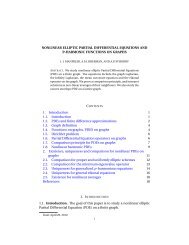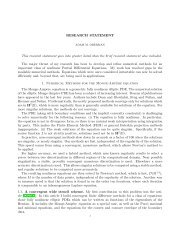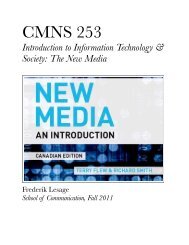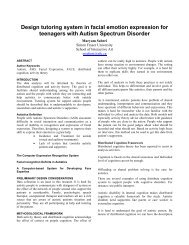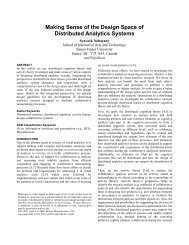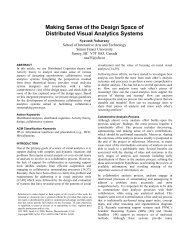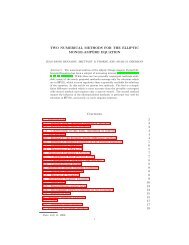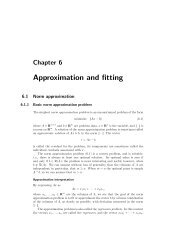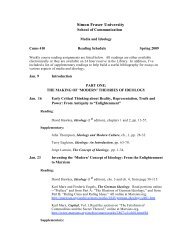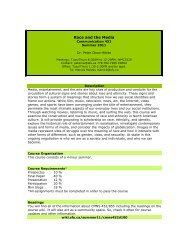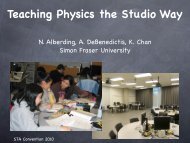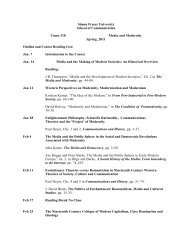CMNS 353 Syllabus - SFU Wiki
CMNS 353 Syllabus - SFU Wiki
CMNS 353 Syllabus - SFU Wiki
You also want an ePaper? Increase the reach of your titles
YUMPU automatically turns print PDFs into web optimized ePapers that Google loves.
Social Impacts of Information TechnologyCommunication <strong>353</strong>Summer 2011Dr. Peter Chow-WhiteMeetings: Thursdays 2:30-5:20 AQ3154Contact: petercw@sfu.ca, 778.782.7289, K9652Office: Tues/Thurs 1:30-2:30PM and by appt.TA: Marcos Moldes mdm19@sfu.caDescriptionInnovations, developments, and the diffusion of new communication technologies arekey processes in the information age. The uses of the Internet and relatedtechnologies are expanding at a dizzying pace. As society undergoes a significanttransformation in terms of work, leisure, and everyday life, new technologies arebeing utilized to shape our personal experiences and our institutions. The Internet,for example, is being used to communicate between friends and family, map thehuman genome, and organize the war on terror. At times, we go willingly into asurveillance society. Often, however, we are unaware of the (global) networks anddatabases through which our personal information flows. These changes areprofoundly impacting the nature of race and gender as we are sorted in new and oldways. In this course, we will explore how new technologies are being shaped byourselves and by entertainment, marketing, and biotechnology industries. At stake inthe bits, bytes, and digital codes of the information age is who we are and who wecan become.ReadingsA set of readings will be made available.Course OrganizationThis course consists of a 3-hour lecture and a 1-hour tutorial.Assignments and GradingTwo Exams 40%Prospectus 10%Term paper 40%Participation 10%*All assignments must be completed in order to pass the course.*All assignments must be submitted on time or marks will be deducted.wiki.sfu.ca/summer11/cmns<strong>353</strong>d100There is a wiki for the course where all of the information about <strong>CMNS</strong> <strong>353</strong> can befound. It will also act as a community space where you will be contributing to thecourse content.
Attendance/ParticipationThis course covers a lot of ground during the term and we have a lot of work to dotogether. First off (and so important), attendance is mandatory. Making it to classand tutorial (on time!) and being present for the lectures and discussions is a largepart of being successful in <strong>CMNS</strong> <strong>353</strong>. Second, group discussion is a central aspect ofour daily class and tutorial life, so please come prepared to talk about the readingsand issues of the day.I expect full, in-depth participation in discussion grounded in the assignedchapters and articles that you read before tutorial and class.Writing: Prospectus and Term PaperWriting for this course consists of two parts: the paper prospectus and the termpaper. The prospectus (2 pages) is due at the beginning of class day 8. In it, youwill outline the topic and give a supporting rationale for choosing it. Theoreticalperspectives, empirical site of study, and potential secondary sources (bibliography)will also be included. You are also required to include a working title and 1 or 2guiding research questions. At this point, you should be in dialogue with me and/orthe TA about how to approach reading, researching, organizing, and writing aboutyour topic. The term paper (3000 words) is due at the end of the course. Bothassignments will be further outlined in the coming weeks and deadlines posted onthe course wiki. Submission of final papers must be in both paper and electronicform to the TA. Submissions will not be considered complete until both are received.If you talk to us about your paper, it will improve your grade.ExamsThere will be two exams throughout the term. The first exam will be on materialcovered from Day 2 to Day 6, and the second will be on Day 8 to Day 11. Each examwill include readings, lectures, videos, and class/tutorial discussions. They are notcumulative. However, as we will discuss in class, learning about communication,technology, identity, and society does not mean simply moving from one topic to thenext. The issues and problems we discuss are interconnected and you will carryconcepts, theories, and ideas from one topic area into the next while making yourown connections between them.ParticipationAs mentioned above, it is crucial to make your voice heard in this course. There willbe plenty of different settings (lecture, tutorial, small group, online) to contribute tothe evolving discussion over the term.DeadlinesAssignments are due on the date indicated. I will not grant extensions except in thedirest of circumstances and under no circumstances will I grant an extension within24 hours of a due date. So please plan your semester ahead of time. As the oldadage goes: Plan your work. Then work your plan! Missed deadlines will be assesseda deduction of one third of a letter grade per day (e.g. from A- to B+ for 1 day late).The prospectus and term paper are due at the beginning of class on their duedates. The penalty for lateness begins immediately after class on the due date.All assignments must be completed in order to pass the course.Student MeetingsMy office time is at the top of the syllabus. Alternatively, you can make anappointment to meet at my office on the mountain or reach me via email.
Day One - IntroductionsCourse Schedule***See Course <strong>Wiki</strong> for Full and Up to Date Schedule**Day Two - Communication and Technology in the Information SocietyC.W. Mills, “The Promise” from The Sociological ImaginationM. Lister et al, New media and new technologies (pp.9-12)R. Hassan, What is the network society?Day Three - Gender and TechnologyJ. Wajcman, From women and technology to gendered technoscienceP. Royse, Women and games: Technologies of the gendered selfDay Four – Race and TechnologyH. Gray, Is (cyber) space the place?L. Nakamura and P. Chow-White, Race and Digital TechnologyDay Five – Film Screening: The Social NetworkDay Six – Social Media and Digital Social NetworksL. Lessig, Sorkin vs. ZuckerbergZ. Smith, Generation Why?Day Seven - Exam 1: Tutorials CancelledDay Eight - Internet I: Throttling, Neutrality, Mashups, and ControlJ. de Beer, Network Neutrality in the Great White NorthL. Lessig. Free Culture**Prospectus Due at the beginning of class week 8**Day Nine - Internet II: Community, Politics, and YouTubeR. Hassan, Tactical MediaP. Lange, Social networking on YouTubeDay Ten - Databases, Data Mining, and PrivacyA. Danna & O. Gandy, All that glitters is not gold: Digging beneath the surface ofdata miningS. Vaidhyanathan, Naked in the ‘nonopticon’Day Eleven - Biotechnology and Health: Databasing The Human BodyG. Moody, The code of lifeP. Chow-White, Communication technologies and the human genomeDay Twelve - Exam 2: Tutorials Cancelled* Subject to change if necessary**See Course <strong>Wiki</strong> for Term Paper Due Date**
Academic IntegrityThe School of Communication is committed to the highest standards of academicexcellence and ethical support. The School expects that the grades in this course willbear some reasonable relation to established university-wide practices with respectto both levels and distributions of grades. The School follows Policy T10.02 withrespect to “Intellectual Honesty” and “Academic Discipline” (See <strong>SFU</strong> Calendar,General Regulations). These policies, procedures and guidelines will be assiduouslyupheld. They protect your rights, as well as those of the faculty.It is particularly important that you be aware of and avoid plagiarism,cheating on exams, submitting a paper to more than one professor, or submitting apaper authored by anyone other than yourself. Violations of this policy will result ina failing grade in the course, and be reported to the proper university office. If youhave any doubts about any of these practices, you must confer with the professor orthe teaching assistant.DisabilityAny students requesting academic accommodations based on a disability arerequired to contact the Centre for Students with Disabilities. For exam and otheraccommodations, students are responsible for contacting the Disabilities ServicesOfficer to arrange their specific exam accommodations at the start of the semester.Then, prior to each exam, students are required to take an Examination RequestForm to their instructor. http://www.sfu.ca/csd or 778-782-3112.



